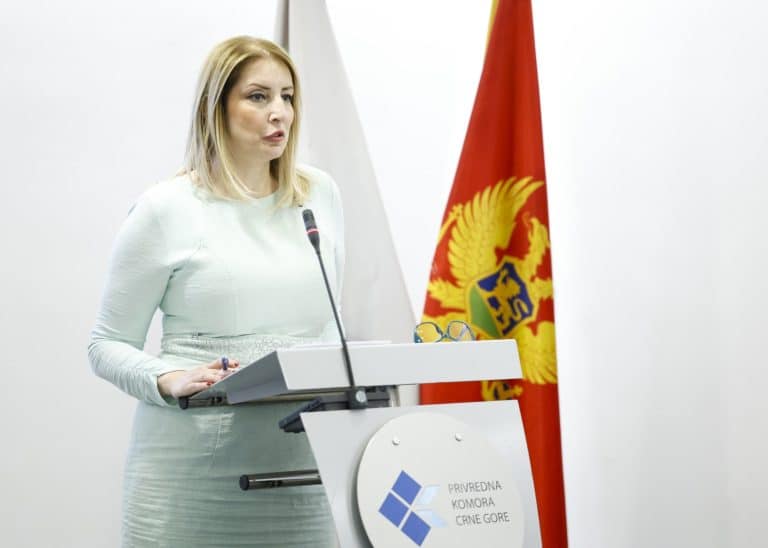Three new projects aimed at improving skills in Montenegro received letters of intent for funding today at a ceremony organized by the Regional Challenge Fund in Podgorica. The fund, supported by Germany and Switzerland, recently announced the winning projects in the third cycle of its program, which provides grants for vocational education and training (VET) programs jointly designed by companies and VET providers from the Western Balkans region.

The complete list of awardees is available here. The Regional Challenge Fund (RCF) aims to enhance the sustainable competitiveness of enterprises in the six Western Balkan economies on their path to the EU single market by funding vocational education and training (VET) institutions. The goal is to collaborate with companies to address business needs for specific skills.
“Through the three calls opened so far, RCF has allocated 3.25 million euros to support a total of seven vocational education and training (VET) projects in Montenegro, with 40 partner enterprises. We remain committed to contributing to the country’s economic growth by enhancing the skills and knowledge of young people, aiming to create a job-ready workforce that local companies need,” said Balša Ćulafić, project coordinator for RCF from the Chamber Investment Forum and coordinator for international cooperation at the Chamber of Commerce of Montenegro.
The third round of applications, organized last year, attracted 155 expressions of interest from across the region, with eight from Montenegro. The selection committee chose the three most successful projects in the country, with an allocated funding of close to 1.62 million euros. These funds will be used to improve the infrastructure of five educational institutions and to train participants in cooperative education programs.

“From our perspective, the Regional Challenge Fund is a true model of success. It fosters direct collaboration between educational institutions and employers, ensuring that the curriculum offered by educational institutions precisely meets the requirements the job market demands from young people today. It contributes to opening attractive career prospects for young people in the Montenegrin job market and helps Montenegrin employers attract qualified workers. We are pleased that the German Federal Government, through the German Development Bank KfW, can provide the Regional Challenge Fund with a total of over 65 million euros for Montenegro and the Western Balkans, from which it can offer substantial seed funding for successful partnerships between educational institutions and businesses for their collaboration,” stated H.E. Peter Felten, German Ambassador to Montenegro.
Today, 75 high-performance personal computers worth 140,000 euros, purchased through the Regional Challenge Fund, will be officially handed over to the Vaso Aligrudić Secondary Electrotechnical School in Podgorica for use in student training.
The Minister of Education, Science, and Innovation, Prof. Dr. Anđela Jakšić-Stojanović, congratulated the grant recipients and expressed satisfaction that the awarded projects involve four vocational secondary schools from Montenegro.

“Investing in education means investing in all positive societal processes, especially in the realm of vocational secondary education. Its improvement, through the development of professional competencies in collaboration with the private sector, directly impacts the alignment of supply and demand in the job market. Therefore, I consider the investment by the Regional Challenge Fund to be of significant importance for the education system, as it aligns with the reform goals of the Ministry of Education, Science, and Innovation, one of which is certainly the further development of vocational secondary education,” stated Jakšić-Stojanović.

Dr. Nina Drakić, President of the Chamber of Commerce of Montenegro, recalled that the Regional Challenge Fund (RCF) is a financial mechanism designed to enhance employability in the Western Balkans and highlighted the significance of the project for both our country and the region.
“Why is this project of great importance for Montenegro and neighboring countries? Because both our country and neighboring countries demonstrate a need to strengthen the knowledge of employees in the economy. Because we increasingly realize that this is the only path to higher quality human resources, and because there is no economic competitiveness without practical education integrated into economic flows. I believe that Montenegro’s economy, and the economies of the neighboring countries, will progress even more through such projects, thereby moving closer to full EU membership,” stated Drakić.

The director of the Vocational Education Center, Aleksandra Lalević, also attended the ceremony.
“The Vocational Education Center strives for excellence and efficiency in vocational education, above all, creating an environment conducive to the development of innovative vocational education that enables comprehensive acquisition of competitive skills, competencies, and qualifications for employability, lifelong learning, inclusivity, personal development, and active citizenship of individuals”, concluded Lalević.